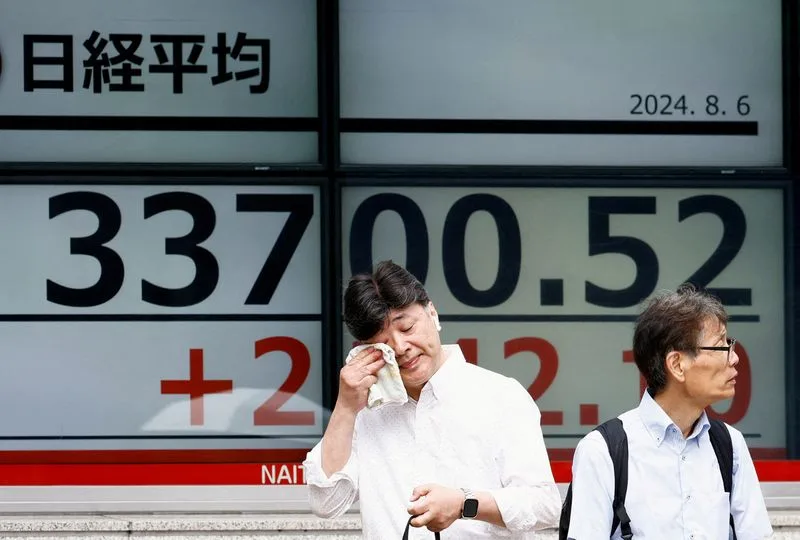HONG KONG (Reuters) – Amidst a generally subdued $400 billion hedge fund sector in Asia, Japan has distinguished itself by attracting new fund launches while other regions experience closures. This trend indicates that the significant market volatility in August has not hindered the revival of Japanese capital markets.
Since 2023, hedge fund closures have outnumbered new launches across Asia, primarily due to the struggling Chinese stock market.
Contrastingly, Japan-focused funds have seen a net increase of over 10 during the same period, according to data from Preqin. Additionally, at least five more Japan-focused funds are either launching or preparing to debut in the third and fourth quarters of the year. These funds encompass a range of strategies, from equity long-short to quantitative approaches, as reported by fund managers or individuals familiar with their plans.
Both domestic and international launches are gaining traction and are being well received by investors.
They highlight a renewed confidence in Japan, long neglected by hedge funds and a wide range of other investors, recently shaken by the biggest single-day stock market drop since 1987. This suggests that Japan’s financial markets are revitalizing after decades on the sidelines for many major investors.
“Japan is finally changing in a positive way, with inflation and wage growth,” said Soichi Utsumi, founder of Shinka Capital Management, which is launching a Japan equity long-short fund.
“I’ve never seen such significant trends in my entire professional career,” added Utsumi, who was previously a partner at hedge fund Asia Research & Capital Management Limited.
In July, Japanese equity markets reached all-time highs, driven by a surge in foreign interest and a push for corporate governance reforms. Interest rates have entered positive territory and are rising for the first time in recent memory, coinciding with economic growth.
Utsumi stated that his fund will concentrate on governance changes and opportunities arising from increasing interest rates, and advisors report that these themes are gaining traction with investors.
“We’ve observed a growing interest in Japan-focused managers,” said Jon Caplis, CEO of hedge fund research firm PivotalPath.
JAPANESE MARKET TURBULENCE
The resurgence of Japanese markets was abruptly halted in early August when a rate hike by the Bank of Japan, coupled with weakening U.S. economic data, led to a sudden appreciation of the yen and a subsequent stock market decline.
Despite these fluctuations, hedge funds remain undeterred by the Japanese market’s volatility.
Hong Kong’s $700 million ActusRayPartners is preparing to launch a new Japan strategy later this month, aiming to raise $100 million by year-end.
The quant fund viewed the market selloff positively, interpreting it as a reversal of a crowded short position on the yen.
Additional encouragement comes from the fact that interest rates have been raised twice this year.
As interest rates are projected to rise further, “this inevitably introduces some market volatility, making it difficult for ‘zombie companies’ to survive, which benefits the long-short strategy,” remarked Tetsuo Ochi, CIO at MCP Group. MCP Group is a $2.5 billion alternative investment firm that predominantly assists Japanese institutions in making global investments.
In August, MCP Group launched a rare Japan-focused fund of hedge funds, attracting a 10 billion yen ($70 million) investment from Japanese insurer Dai-ichi Life, according to MCP.
Dai-ichi Life’s investment is intended to support emerging managers and contribute to revitalizing Japan as an asset management hub, the insurer noted in a separate statement.
Additionally, two other new Japan-focused funds have been introduced: the multi-manager platform Penglai Peak Offshore Fund and OQ Funds Management’s new Japan strategy. Bloomberg previously reported on the latter, citing the fund’s manager. Lighthouse Investment Partners, the owner of Penglai Peak, did not respond to requests for comment.
A recent Preqin survey conducted in August revealed that an increasing number of global investors intend to decrease hedge fund allocations in their portfolios, citing returns that have fallen behind certain benchmarks.
In contrast, Japan’s long-short equity funds have shown a strong performance, achieving positive returns in 70% of quarters over the past five years up to the second quarter of 2024, as reported by With Intelligence.
($1 = 143.6000 yen)
(Reporting by Summer Zhen; Editing by Tom Westbrook and Shri Navaratnam)
